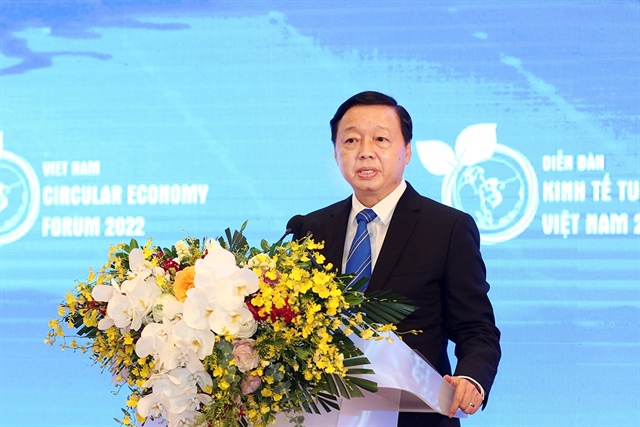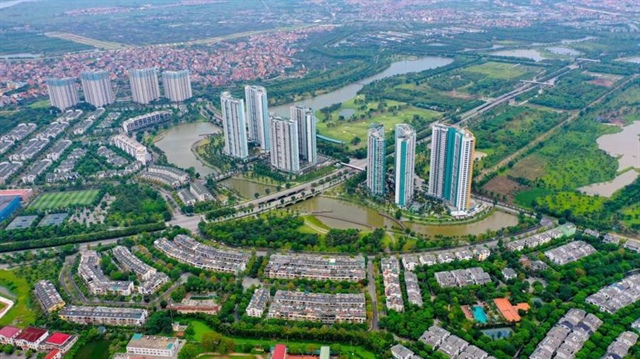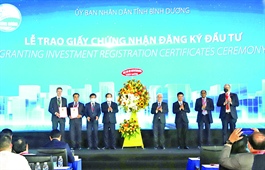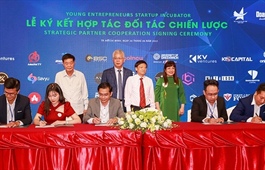Vietnam to draft national action plan for circular economy adaptation
Vietnam to draft national action plan for circular economy adaptation
The adaptation of circular economic models would help Vietnam realize its commitment to net-zero carbon emissions target by 2050.
The Ministry of Natural Resources and Environment (MONRE) today [June 28] held a conference to kickstart the formulation of a national action plan to promote a circular economy in Vietnam.

Minister of MONRE Tran Hong Ha at the event. Photos: UNDP |
At the event, Minister of MONRE Tran Hong Ha said climate change, environmental pollution, and the degradation of the natural ecosystem are posing threats to the world.
He referred to the sixth assessment report of the Intergovernmental Panel on Climate Change (IPCC-AR6) which stated that if global warming gradually increases 1.5 degrees Celsius above the pre-industrial level, some impacts may be lasting or irreversible, such as the loss of some ecosystems.
The IPCC also estimated since 2008, around 20 million people annually have been forced to leave their homes behind due to extreme weather conditions, and half of the population are facing water shortage for at least one month per year.
Such a dim view has been shared by the UN and the World Meteorological Organization which called for swift action to mitigate the effects of climate change.
In this regard, Ha argued the linear economic models of take-make-dispose across the world over the past 150 years are not working.
“The UN warned the continuation of this models until 2030 would result in a triple increase in the consumption demand for natural resources, surpassing the earth’s supply capacity and the amount of waste would cause huge damage to the environment,” Ha said.
The minister, therefore, called for a more effective economic model in terms of utilization of natural resources, combating climate change, and protecting the environment.
“The adoption of circular economic models would help Vietnam realize its commitment for net-zero carbon emission, bring benefits for the nation and people,” he added.
The country, however, is expected to face certain challenges during this transition period, Ha said, referring to the lack of effective regulations and resources.
“The involvement of the entire political system and the positive response from the public could accelerate the process,” Ha said.
The minister called for a favorable legal environment to promote a circular economy, including clear responsibilities from businesses in retrieving and recycling wastes; incentives to nurture the environmental industry, including the recycling one; criteria for green public procedures and use of recycled products.
Ha expected a roadmap to gradually phase out single-use plastic products, which should be replaced with environmentally-friendly ones.
“Circular economy should also be integrated into strategies and planning process for the development of urban areas and industrial parks,” he said.
Ha also noted the Government would support businesses accessing financial resources and technologies required for the circular economy, along with raising public awareness of this model.

UNDP Resident Representative in Vietnam Caitlin Wiesen. |
Vietnam – an example of pursuing green growth
UNDP Resident Representative in Vietnam Caitlin Wiesen noted Vietnam’s commitments at the COP26 for net-zero carbon emission by 2050 and the introduction of the circular economy concept in the revised Law on Environmental Protection marked profound changes in the country’s transition process toward sustainability.
For Vietnam to achieve an inclusive circular economy with low carbon emissions, Wiesen expected the country to lower the consumption of fossil fuels, and promote the use of renewables.
According to Wiesen, economic recovery from the pandemic would offer a historical opportunity for countries to shift to a more sustainable and inclusive growth model.
She believed that circular economy is an economic opportunity for Vietnam and investing in governance systems, developing strong institutions and policies, fostering sustainable business and bypassing pollutive industries will help Vietnam rebound to the green economy of the future.
"We believe that joining our collective efforts and openly sharing data and knowledge will help to shift mindsets, and frame and adopt a narrative around a circular economy that is tailored to the needs, the history, and the ambitions of the people of Vietnam,”said Caitlin Wiesen.
Kristin Hughes, Director of the Global Plastic Action Partnership (GPAP) under the World Economic Forum, said Vietnam is going through a rapid economic development process, which has also raised concern over environmental consequences due to the huge volume of plastic waste being discharged into the environment every year.
Hughes expected a circular economy not only to play a big part in realizing environmental protection goals but also to create more jobs for locals.
Given Vietnam’s strong commitments at the COP26, Hughes noted the country is showcasing its leadership role for green growth.
|
In June, the Vietnamese Government issued a plan to promote the circular economy, which targets to reduce greenhouse gas emissions per GDP by at least 15% by 2030 against 2014, and eventually realize the net-zero carbon emission target by 2050. By 2025, the Government expects circular economic projects to start having positive impacts on the economy, society, technologies, and environment, contributing to the restoration of renewable resources, reducing energy consumption, and enlarging the proportion of renewables to the total energy provision. Vietnam also targets to recycle and reuse up to 85% of plastic waste; reduce 50% of plastic waste in the oceans and seas compared to the previous periods; gradually phase out the use of nylon bags and single-use plastic products. The Government aims to enhance the capabilities of recycling organic waste in the urban and rural areas and raise public awareness of the consumption of using plastic products. By 2030, the rate of solid waste collected and treated under the circular economic models would reach 50%; 100% of organic waste in urban areas and 70% in rural areas would be recycled; wastewater in urban areas would be treated to the maximum under national standards. |























